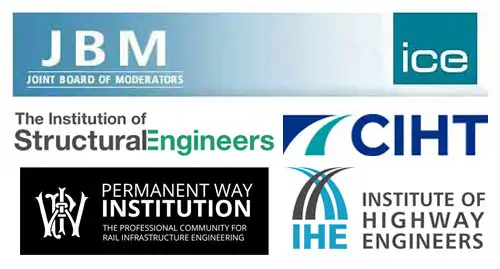Final award:
- IfATE Level 6 apprenticeship
- BEng (Hons) Civil Engineering
- IEng status
Option 1:
- IfATE Level 6 Civil Engineer (degree) apprenticeship
Option 2:
- IfATE Level 4 Civil Engineering Senior Technician apprenticeship
- IfATE Level 6 Civil Engineering Site Management (degree) apprenticeship
The apprenticeship gained depends on the pathway chosen, which is based on the apprentice’s job role. More details of the apprenticeship route can be found in the Apprenticeship Standard section.
| Duration |
5 years |
| Entry point(s) |
September/October |
| Application deadline |
31st July |
Overview
Please note: The L6 Civil Engineer and L6 Civil Engineering Site Management degree apprenticeship standards have recently been updated. As a result, the information on this page will change for those joining the program in 2025. We will update this page with the new details as soon as they become available.
- This course is for bright, motivated individuals who want to fast-track their career and become the Chartered Engineers of tomorrow.
- Apprentices will study a broad range of topics such as project management, mathematics, geotechnics, structural engineering, and safety and sustainable development.
- Block teaching allows apprentices to fully immerse themselves in learning and benefit from University facilities. Apprentices will study in our newly refurbished labs, which recently underwent a £6.5million investment.
- A unique degree apprenticeship programme catering for both the Civil Engineering Site Management (degree) standard and the Civil Engineer (degree) standard.
- Developed in partnership with industry leaders:
- Laing O’Rourke, the UK’s largest privately-owned construction firm;
- Bouygues, a blue chip construction firm;
- WSP, an international consultancy firm;
- EDF Energy, one of the UK’s largest energy suppliers.
Top 10 in the UK for General Engineering
Developed in partnership with industry leaders
£6.5million investment in our teaching labs, workshop spaces and equipment
Top 10 in the UK for General Engineering
Developed in partnership with industry leaders
£6.5million investment in our teaching labs, workshop spaces and equipment
Accreditations
Level 6 Civil Engineer (degree) apprenticeship and Level 6 Civil Engineering Site Management (degree) apprenticeship
These degrees are accredited by the Joint Board of Moderators (JBM)* on behalf of the Engineering Council - for the purposes of:
- fully meeting the academic requirement for registration as an Incorporated Engineer (IEng)
- and partially meeting the academic requirement for registration as a Chartered Engineer (CEng).
Candidates must hold a masters or doctorate accredited as further learning for CEng to hold accredited qualifications for CEng registration.
See www.jbm.org.uk for further information and details of Further Learning programmes for CEng.
Level 4 Civil Engineering Senior Technician apprenticeship
This degree is accredited by the Joint Board of Moderators (JBM)* on behalf of the Engineering Council - for the purposes of:
- fully meeting the academic requirements for registration as an Engineering Technician (EngTech)
- and partially meeting the academic requirement for registration as an Incorporated Engineer (IEng).
Candidates must hold a Bachelors (with or without honours) accredited as Further Learning for IEng to hold accredited qualifications for IEng registration.
See www.jbm.org.uk for further information and details of Further Learning programmes for IEng.
* The Joint Board of Moderators comprises the Institution of Civil Engineers (ICE), the Institution of Structural Engineers (IStructE), Institute of Highway Engineers (IHE), the Chartered Institution of Highways and Transportation (CIHT) and the Permanent Way Institution (PWI).
Expand text
Entry requirements
| Qualification |
Typical offer |
Required subjects |
| A Level |
ABB |
GCE AL Maths grade B and another science* subject at grade B. Candidates may offer GCE AL Maths, Pure Maths or Further Maths |
| IB |
32/655 |
HL5 in Mathematics (Analysis and Approaches) and HL5 in another Science subject. Applicants achieving IB Maths SL7 plus IB HL5 in Physics will also be considered. |
| BTEC Extended Diploma |
DDM |
See below+ |
| T-Level |
Distinction |
T-Level in Design and Development for Engineering and Manufacturing |
| GCSE |
4 or C |
Grade 4/C in GCSE English language and Mathematics |
| Equivalences |
View other grade equivalences |
NB General Studies is not included in any offer.
*GCE AL/AS science includes: Biology/Human Biology**; Chemistry; Computing; Design and Technology; Economics; Electronics; Environmental Studies; Geography; Geology; Life and Health Sciences; Physical Education; Physics; Psychology; Science (applied); Statistics.
**If more than one of these is taken they would only count as one 'science' but could count as two A-levels towards our general requirements.
+Applicants studying one of the following BTEC Extended Diplomas will be considered: Applied Science, Aeronautical Engineering, Building Services Engineering Construction and the Built Environment, Civil Engineering, Operations and Maintenance Engineering, Computer Engineering, Electrical/Electronic Engineering, Engineering, Manufacturing Engineering, Mechanical Engineering, Environmental Sustainability.
There is a requirement from the Education and Skills Funding Agency that apprentices hold a level 2 qualification in English and Mathematics.
If an applicant does not hold GCSE's (C /4 or above) in English and Maths or cannot evidence these or equivalent qualifications, they should be willing to work towards Level 2 Functional Skills qualifications prior to Gateway.
For more information about how we support Functional Skills, click here.
Applicants must also have a valid and eligible residency status to gain entry onto the apprenticeship – please see the ESFA guidance for further information.
If you are studying Maths and Science at level 3 or above and have grades below what we are advertising, please get in touch as we can take relevant work experience and additional employer support into account when making application decisions.
Read more
How to apply
This programme does not follow the standard UCAS application process. Apprentices can apply in addition to applying to any institution(s) through UCAS. To gain a place on this programme applicants must either:
- Apply directly for a Level 6 Civil Engineering apprenticeship vacancy:
- Our current vacancies page lists apprenticeship opportunities where we are the training provider
- With a relevant employer – please check their websites
- Via the GOV.UK website
- Already have a position or job offer from an engineering company willing to support their application.
Once an apprentice is able to meet one of the above options, please get in touch with us via the contact methods lists above and we will proceed with the application.
View more information on how to apply.
Funding
Full programme cost: £27,000 or £29,000
The employer fully covers the cost of the apprenticeship; apprentices do not pay for any of the eligible training costs. The apprentice will be an employee of the organisation, gaining a University of Exeter award alongside working and earning a salary.
Employers who pay the Apprenticeship Levy will pay for the apprenticeship fees directly through that contribution.
Employers who do not pay the Levy will be able to claim 95 per cent of the cost of the apprenticeship from the Government. Up to 100 per cent Government contribution may be available if the employer has fewer than 50 employees and:
- Recruits an apprentice aged 16-18
- OR an apprentice aged 19-24 who has previously been in care or who has a local authority education, health and care plan
See further information on the Apprenticeship Levy funding.
Employers must pay their apprentices a salary at least consistent with national legislation.
Funding eligibility criteria
To be eligible for funding the apprentice must meet the criteria listed in the ESFA guidance.
The apprentice must have a valid and eligible residency status to gain entry onto the apprenticeship – please see the ESFA guidance for further information.
Read more

Molly
Studied the Civil Engineering Degree Apprenticeship

Thomas
Studied the Civil Engineering Degree Apprenticeship

Ryan
Studied the Civil Engineering Degree Apprenticeship
Molly
Studied the Civil Engineering Degree Apprenticeship
The degree apprenticeship has allowed me to develop my technical skills in all areas of engineering, not just my discipline, and given me the skills and confidence to expand my knowledge into cross-discipline projects.
Thomas
Studied the Civil Engineering Degree Apprenticeship
During my time at the University of Exeter, I experienced the institution's unique commitment to incorporating industry needs into the curriculum, ensuring apprentices, including myself, gain relevant and up-to-date skills sought by employers.
Ryan
Studied the Civil Engineering Degree Apprenticeship
After finishing my A-levels and starting my career, the idea of studying at a Russell Group university six years later seemed impossible. However, with the degree apprenticeship, what once seemed impossible became a reality. Looking back on my experience at the University of Exeter, I have fond memories that will stay with me forever.
Course content
Engineering remains at the heart of the UK economy and the demand for skilled and qualified engineering has never been higher. Our ambition is for our apprentices to graduate with chartered status in sight, having been fully prepared by us to achieve this.
Elements of the apprenticeship will be studied during time at work with the majority of studies taking place in four, two-week blocks, delivered by University of Exeter academic staff.
Throughout the apprenticeship, apprentices will gain more knowledge and experience ensuring they are able to:
- Ensure that projects are completed to the specification and quality needed by clients
- Ensure projects have minimal negative impact on the environment and community
- Manage interfaces between stakeholders associated with the project
- Translate design information to construction teams so they can construct the project effectively and efficiently
Apprentices can expect to be stretched and challenged, but supported throughout their apprenticeship as they focus on building the knowledge, skills and experiences they need to become a professionally qualified engineer.
The modules we outline here provide examples of what you can expect to learn on this degree course based on recent academic teaching. The precise modules available to you in future years may vary depending on staff availability and research interests, new topics of study, timetabling and student demand.
Year 1
Compulsory modules
| Code | Module | Credits |
|---|
| ENG1200DA | Core Engineering | 30 |
| ENG1201DA | Mathematics for Engineers | 15 |
| ENG1203DA | Professional Studies and Skills Development A | 15 |
Year 2
Compulsory modules
Year 3
Compulsory modules
Year 4
Compulsory modules
Year 5
Compulsory modules
Year 1
Compulsory modules
| Code | Module | Credits |
|---|
| ENG1200DA | Core Engineering | 30 |
| ENG1201DA | Mathematics for Engineers | 15 |
| ENG1203DA | Professional Studies and Skills Development A | 15 |
Year 2
Compulsory modules
Year 3
Compulsory modules
Year 4
Compulsory modules
Year 5
Compulsory modules
Learning
Approximately 20 per cent of an apprentice's contractual working time is dedicated to study. Block release allows full immersion in studies.
Years one to three provide fundamental knowledge of engineering science as well as applying mathematics to engineering problems. Skills also developed include: project management, health and safety, socio-environmental impacts and future responsibilities to society.
The final two years are spent applying knowledge to engineering problems. Apprentices will complete an Individual Project in the final year; an opportunity to apply knowledge and skills to devise an engineering solution at a professional level. The Individual Project can be done in collaboration with employers, giving the company a tangible benefit.
Study blocks comprise of lectures, seminars and workshops. During and outside of blocks apprentices will meet one-to-one with their academic mentor. In addition to studying, block teaching provides opportunities for networking with peers. We run four, two-week long blocks of teaching each year.
Apprenticeship Standard
Alongside studying for their level 6 apprenticeship, gained after completing the Knowledge, Skills and Behaviours of the apprenticeship standard(s), apprentices also work towards a BEng in Civil Engineering and their professional accreditation (IEng status) through the Institution of Civil Engineers (ICE). Below are the apprenticeship standards related to each pathway:
The Contracting Pathway – 5 Year Programme (total Funding £29,000):
L4 Civil Engineering Senior Technician (Funding £11,000) – Years 1 and 2 of programme
L6 Civil Engineering Site Management (Funding £18,000) – Years 3 to 5 of programme.
The Consultancy Pathway – 5 Year Programme (total Funding £27,000):
L6 Civil Engineer (degree) (Funding £27,000) – Years 1 to 5 of programme.
Read more
Careers
About the apprenticeship
Apprentices will be a full salaried member of an organisation, typically earning between £13,000 and £19,000. Much of the learning will take place at work, either through projects linked to academic content or time set aside for distance learning. Apprentices will be working in an exciting and relevant job from day one of their studies, meaning when they graduate, they'll have both the professional and academic experience sought after by employers.
Employer valued skills
Solid industry experience is what employers look for when recruiting. The structure of the apprenticeship standards means that apprentices will gain knowledge, skills and behaviours which will lead to Incorporated Engineer status at the end of the programme. This is an industry-recognised standard which defines an apprentice's capabilities as a Civil Engineer. They will have gained experience in areas including: project management; delivering large-scale projects on-budget; managing engineering practices in a safe and sustainable way and communicating with clients and workers of all levels.












